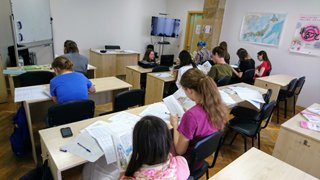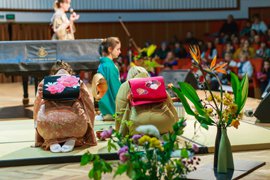The Winds of Change are Blowing
Ukraine-Japan Center
FUJISAKI Yasunori
The Role of the Japanese-Language Specialist in Ukraine
Last July (2017) the dispatch of the latest Japanese-Language Specialist (hereinafter “Specialist”) to Kyiv University came to an end, bringing to the end the dispatch of Specialists to that institution that started in 1996. And in August of this year (2018), the dispatch of Japanese-Language Assistants at the Kyiv National Linguistic University will come to an end as well. Accordingly, the only Specialist dispatched to Ukraine by the Japan Foundation will be the one working at the Ukraine-Japan Center “UAJC” (hereinafter “UAJC”). This will mean that my duties in that position will be wide ranging. In addition to UAJC related tasks (teaching three Japanese classes per week, preparing curriculums and teaching materials, and administrative tasks such as accounting and budgeting), they will also need to start holding study groups for teachers, travel around primary and secondary educational institutions, and provide support for the Japanese Teachers Association of Ukraine to ensure no issues occur due to the departure of the other two Specialists. The Specialist is also in charge of supporting the Japanese-language educational institutions spread throughout Ukraine, the second largest country in area in Europe, as well as activities to encourage people to learn Japanese.
Incorporating Tadoku Reading in Pre-Intermediate Class
UAJC located in the capital of Kiev provides Japanese-language education to a wide range of the general public as part of continuing education. At any given time, there are between 250 to 300 learners at the UAJC divided into seven levels from starter to intermediate-advanced. For the past several years, we have been using the “Marugoto: Japanese-Language and Culture” Japanese-teaching materials published by the Japan Foundation, and have been using them in starter and elementary courses where they have been well received as a fun way to learn. The number of students at the UAJC have risen as a result. However, since there are no other Japanese-language educational institutions for working adults in the city, many of the students who knock on the doors of the UAJC are highly intent on learning and would not be satisfied simply by having a good time.
In order to help those learners reach a higher level course, it is necessary to teach grammar a bit more systematically and help them increase their vocabulary. Accordingly, I have begun using an original curriculum for those third-year learners to improve their four main skills (listening, speaking, reading, and writing) in a balanced manner. I took measures to ensure students retain what they learn by following a step-by-step process from grammar introduction, through oral practice for familiarization with speaking, to realistic practice for real life application, I also decided to have the students re-study kanji from scratch. Finally, I made the decision to incorporate Tadoku reading activities into the class to help build reading ability, which is a major hurdle for learners.

Tadoku reading activities in the classroom
At first, I was worried that the students would quit if I made this too difficult for them considering that there would be tests every class, but despite my concerns, the students have adjusted to this new approach. In fact, it seems the learners are particular enjoying the Tadoku reading activity, a Japanese reading approach involving reading multiple short texts with a focus on completion rather than comprehending each word. At the start of the Tadoku activity in each class, the students actually seem to rush to the table where the reading materials are stacked. The students’ eyes seem to sparkle when the Tadoku reading time arrives, even those who are normally quiet and reserved during conversation class, and there are those who will happily read the same book over and over again saying “I chose this because I like this one!” The comments they leave in their Tadoku reading diaries are often simple, unfiltered reactions such as “Amazing!” or “I was moved!” Accordingly, the class is providing me as the teacher numerous hints as to what sort of language practice is most meaningful for these learners of Japanese in a land where they cannot normally interact with Japanese people.
Post Revolution Ukraine, Teachers, and Ongoing Challenges
Today, Kiev has regained its equilibrium lost during the Maidan Revolution of 2014. However, the political situation remains unstable and the economy continues to stagnate despite significant investment and aid from Western countries including Japan. Meanwhile, the population of Ukraine has declined from 54 million to 46 million people in the past dozen years or so as people move out of the country seeking a more abundant lifestyle. With an inflation rate of nearly 15%, the daily lives of the people are becoming increasingly impoverished as the price of goods continue to rise before their eyes.
And the lives of Japanese teachers are no exception to this. Despite being full time employees at universities, their compensation is in no way guaranteed, and there are cases where their salary is only half the average announced by the state. As a result, there is high turnover among young Japanese-language teachers, causing concerns over the declining quality of education. Accordingly, there is now an urgent need for basic teacher training, including how to analyze textbooks and prepare teaching plans. Training on teaching conversation classes is also an urgent need due to the fact that local teachers tend to be weak in that area.
As one step in handling these challenges, we have decided to hold an intensive six-day course on Japanese conversation this summer in Lviv, an ancient city in the West of Ukraine. As the Specialist, I will travel to the city and work as a pair with a local teacher to run the conversation class. Before it starts, I also plan to hold a separate workshop on how to teach conversation classes. I am hoping that this opportunity will encourage local teachers to more actively engage in teaching conversation classes.
So, while the Specialist in Ukraine cannot be said to enjoy ideal conditions for the job, I intend to provide educational support as efficiently and effectively as possible to help maximize the limited human resources available in the country.

Students give Sado, a tea ceremony, demonstration at a cultural festival
- What We Do Top
- Arts and Cultural Exchange [Culture]
- Japanese-Language Education Overseas [Language]
- Japanese-Language Education Overseas [Language] Top
- Learn Japanese-language
- Teach Japanese-language
- Take Japanese-Language Test
- Know about Japanese-language education abroad
- The Japanese-Language Institute, Urawa
- The Japanese-Language Institute, Kansai
- Japanese-Language Programs for Foreign Specified Skilled Worker Candidates
- Japanese Language Education for Japanese Children Resident Overseas and for the Descendants of Migrants
- Archives
- Japanese Studies and Global Partnerships [Dialogue]
- JF digital collection
- Other Programs / Programs to Commemorate Exchange Year
- Awards and Prizes
- Publications
